|
|
|
Sort Order |
|
|
|
Items / Page
|
|
|
|
|
|
|
| Srl | Item |
| 1 |
ID:
170017
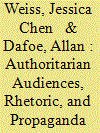

|
|
|
|
|
| Summary/Abstract |
How do government rhetoric and propaganda affect mass reactions in international crises? Using two scenario-based survey experiments in China, one hypothetical and one that selectively reminds respondents of recent events, we assess how government statements and propaganda impact Chinese citizens’ approval of their government's performance in its territorial and maritime disputes. We find evidence that citizens disapprove more of inaction after explicit threats to use force, suggesting that leaders can face public opinion costs akin to audience costs in an authoritarian setting. However, we also find evidence that citizens approve of bluster—vague and ultimately empty threats—suggesting that talking tough can provide benefits, even in the absence of tough action. In addition, narratives that invoke future success to justify present restraint increase approval, along with frames that emphasize a shared history of injustice at the hands of foreign powers.
|
|
|
|
|
|
|
|
|
|
|
|
|
|
|
|
| 2 |
ID:
170023


|
|
|
|
|
| Summary/Abstract |
How can we explain the dynamics of nonconventional struggles such as the Gaza flotilla case of May 2010? Most international relations scholars analyze international disputes using a “chess logic,” according to which the actors seek to outmaneuver their opponents on the battleground. However, an increasing number of clashes are guided by a “performance logic”: although the players interact with one another, their real targets are audiences. The present study aims to bridge this gap, proposing a phenomenological framework for analyzing this particular kind of performative contest over legitimation and delegitimation in contemporary conflicts. It expands upon the idea that current anarchical global politics increasingly lead contending actors to engage in “pure” legitimation struggles—“battles for legitimacy”—seeking to persuade international audiences that they deserve political support. After providing guidelines for the identification of these phenomena, this article presents a model for the methodical examination of their interactive dynamics based on three legitimation functions (appropriateness, consensus, empathy). This model is applied to the flotilla case by mapping the protagonists’ framing contests across “legitimation (battle)fields.” The findings of this study, which emphasize the strong interplay between normative, political, and emotional mechanisms for empowering (de)legitimation strategies, can contribute to expanding the research program concerning international legitimacy.
|
|
|
|
|
|
|
|
|
|
|
|
|
|
|
|
| 3 |
ID:
170014


|
|
|
|
|
| Summary/Abstract |
New international agreements often recycle language from previous agreements, using boilerplate solutions alongside customized provisions. The presence of boilerplate in international agreements has important implications for understanding how international rules are made. The determinants behind boilerplate in international agreements have not previously been systematically evaluated. Using original data from a sample of 348 preferential trade agreements (PTAs) adopted between 1989 and 2009, we combine novel text analysis measures with Latent Order Logistic (LOLOG) graph network techniques to assess the determinants behind boilerplate in labor and environmental provisions commonly found in PTAs. Our results indicate that whereas boilerplate can be used for both efficiency and distributive purposes, international boilerplate is used primarily for efficiency gains and power-distribution considerations are not systematically important.
|
|
|
|
|
|
|
|
|
|
|
|
|
|
|
|
| 4 |
ID:
170031
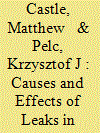

|
|
|
|
|
| Summary/Abstract |
International negotiations are founded on secrecy. Yet, unauthorized leaks of negotiating documents have grown common. What are the incentives behind leaks, and what are their effects on bargaining between states? Specifically, are leaks offensive or defensive: are they intended to spur parties to make more ambitious commitments, or are they more often intended to claw back commitments made? We examine these questions in the context of trade negotiations, the recurring form of which affords us rare empirical traction on an otherwise elusive issue. We assemble the first dataset of its kind, covering 120 discrete leaks from 2006 to 2015. We find that leaks are indeed rising in number. Leaks are clustered around novel legal provisions and appear to be disproportionately defensive: they serve those actors intent on limiting commitments made. The European Union (EU) appears responsible for the majority of leaks occurring worldwide. Using party manifesto data to track changing ideological positions within the EU, we find that the occurrence of leaks correlates with opposition to economic liberalization within the average EU political party. Moreover, leaks appear effective in shifting public debate. We examine trade officials’ internal communications and media coverage in the wake of a specific leak of negotiations between Canada and the EU. A given negotiating text attracts more negative coverage when it is leaked than when the same text is officially released. In sum, political actors leak information strategically to mobilize domestic audiences toward their preferred negotiating outcome.
|
|
|
|
|
|
|
|
|
|
|
|
|
|
|
|
| 5 |
ID:
170012
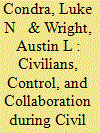

|
|
|
|
|
| Summary/Abstract |
What affects civilian collaboration with armed actors during civil war? While theory and evidence confirm that harm by armed actors influences when and with whom civilians collaborate, we argue that collaboration is also a function of civilians’ perceptions of armed actors’ efforts to minimize collateral casualties. We test this argument using a series of nationwide surveys of Afghan civilians conducted quarterly between 2013 and 2015. Our data record civilian willingness to report roadside bombs to government authorities and perceptions of government and Taliban efforts to minimize civilian harm. Civilians are less (more) willing to collaborate with the government when they perceive the government (Taliban) carelessly using force, even after accounting for political sentiment, local security conditions, and a range of additional confounding factors. Moreover, our evidence suggests that perceived carelessness in the rival’s area of control influences collaboration. We discuss how these empirical results inform broader literatures on collaboration, conquest, occupation, and control.
|
|
|
|
|
|
|
|
|
|
|
|
|
|
|
|
| 6 |
ID:
170028


|
|
|
|
|
| Summary/Abstract |
Political corruption is rampant in—and destructive to—many parts of the world. A growing number of international organizations (IOs) claim to address the problem by encouraging good governance norms and rules, such as anti-corruption standards and practices. Whether membership in IOs dampens corruption, however, is unclear. Our central argument is that the characteristics of IO membership determine both whether corruption is tolerated and the extent to which formal anti-corruption rules effectively combat the problem. First, groups of corrupt states are reticent to enforce good governance norms or rules against other IO members, rendering punishment for corruption incredible. Second, leaders may witness the value of corruption to their IO peers and learn to act the same way. Using a variety of data sources and estimation strategies, including new data on IO anti-corruption mandates, we demonstrate that: (1) countries that participate in member-corrupted IOs are significantly more likely to engage in corruption themselves—and experience an increase in corruption over time—than are countries that participate in less corrupt IOs; and (2) this tolerance for corruption occurs even within IOs that have adopted formal anti-corruption mandates, rendering good governance rules largely cheap talk among organizations governed by corrupt principles.
|
|
|
|
|
|
|
|
|
|
|
|
|
|
|
|
| 7 |
ID:
170030


|
|
|
|
|
| Summary/Abstract |
It is now commonplace for scholars to note that the number of international nongovernmental organizations (INGOs) has exploded. But, in recent years, the growth rate of INGOs globally and in the United States has stagnated. We argue this stagnation can best be explained by changes in the environment in which INGOs work. Specifically, the now dense population environment discourages new INGOs from being founded, while also encouraging competition. Analysis of a new, comprehensive dataset on American INGOs between 1992 and 2012 supports the argument, as do case studies of trends within the environmental conservation and democracy assistance sectors. The analysis suggests that debates about INGO cooperation and competition overlook a key environmental factor that varies across and within populations of organizations: density. We draw out the implications of this approach for contemporary global governance.
|
|
|
|
|
|
|
|
|
|
|
|
|
|
|
|
| 8 |
ID:
170033


|
|
|
|
|
| Summary/Abstract |
Mistrust between conflict parties after civil war is a major hurdle to sustainable peace. However, existing research focuses on elite interactions and has not examined the trust relationship between government and rank-and-file members of armed groups, despite their importance for postconflict stability. We use the unexpected decision of the Colombian government to extradite top-level former paramilitary leaders to the United States in 2008 to identify how a peace deal reversal influences ex-combatants’ trust in government. In theory, they may lose trust for instrumental reasons, if they suffer personal costs, or for normative reasons, if they think the government is failing its commitments. Using quasi-experimental survey evidence, we find that extradition decreases trust substantially among ex-paramilitaries, but not in a comparison group of ex-guerrillas not part of the same peace deal. Even though paramilitaries are seen as particularly opportunistic, our evidence suggests that normative rather than instrumentalist considerations led to trust erosion.
|
|
|
|
|
|
|
|
|
|
|
|
|
|
|
|
| 9 |
ID:
170032


|
|
|
|
|
| Summary/Abstract |
Theories of crisis (de-)escalation often focus on conflict, stress, and information problems. However, crisis (de-)escalation may sometimes hinge on how de-escalation is interpreted by domestic audiences. In this article, I combine Putnam's two-level games model of diplomacy with Erving Goffman's concepts of interaction order and face to create a mechanism I call “diplomatic presentation.” I show how diplomatic presentation can be instrumental for the crafting of diplomatic outcomes that states believe are in their mutual interest but that run the risk of being rejected by their domestic publics. Successful diplomatic presentation requires that states collude together to manage their performance, engage in teamwork, and control the impact of unsympathetic audiences. In evaluating this mechanism, I analyze the diplomacy surrounding the Iran Hostage Crisis. During this crisis, regime officials from the United States and Iran colluded in a theatrical “scenario,” in which both sides adopted specific roles in order to satisfy the sentiments of US and Iranian publics. I show that complications regarding the presentation of this scenario explain escalation of the crisis better than prominent alternatives. This argument contributes to the growing literature on symbolic diplomacy in international relations, while also challenging common assumptions about the adversarial nature of crises.
|
|
|
|
|
|
|
|
|
|
|
|
|
|
|
|
| 10 |
ID:
170035
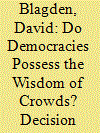

|
|
|
|
|
| Summary/Abstract |
What is it about democracies—if anything—that enables them to avoid war with each other while navigating conflictual international politics in pursuit of their own interests? Recent research in International Studies Quarterly by Brad LeVeck and Neil Narang (2017) provides an elegant new answer to this longstanding question. Drawing on “wisdom of crowds” logic—the insight that a large-enough group of inexpert judges is more likely to average towards an accurate estimate of a continuous variable than a smaller group, even when the smaller group contains relevant experts—supported by experimental evidence, they suggest that democracies’ strategic advantages lie in their large, diverse decision-making communities. If such crowd wisdom equips democracies to accurately assess others’ capabilities and intentions, so the argument goes, then they should be better than alternative regime types at maximizing their own interests while still avoiding the bargaining failure that is resort to war. Unfortunately, however, the politics of democratic foreign policy-making compromise the crowd-wisdom mechanism. This response article thus elucidates key flaws in the argument that crowd wisdom underpins democratic peace, before progressing to explain how the crowd-wisdom insight nonetheless carries important implications—irrespective of regime type—for strategic effectiveness.
|
|
|
|
|
|
|
|
|
|
|
|
|
|
|
|
| 11 |
ID:
170024


|
|
|
|
|
| Summary/Abstract |
International regulatory agreements depend largely on self-reporting for implementation, yet we know almost nothing about whether or how such mechanisms work. We theorize that self-reporting processes provide information for domestic constituencies, with the potential to create pressure for better compliance. Using original data on state reports submitted to the Committee Against Torture, we demonstrate the influence of this process on the pervasiveness of torture and inhumane treatment. We illustrate the power of self-reporting regimes to mobilize domestic politics through evidence of civil society participation in shadow reporting, media attention, and legislative activity around antitorture law and practice. This is the first study to evaluate systematically the effects of self-reporting in the context of a treaty regime on human rights outcomes. Since many international agreements rely predominantly on self-reporting, the results have broad significance for compliance with international regulatory regimes globally.
|
|
|
|
|
|
|
|
|
|
|
|
|
|
|
|
| 12 |
ID:
170008


|
|
|
|
|
| Summary/Abstract |
We investigate the impact of the US drone program in Pakistan on insurgent violence. Using details about US-Pakistan counterterrorism cooperation and geocoded violence data, we show that the program was associated with monthly reductions of around nine to thirteen insurgent attacks and fifty-one to eighty-six casualties in the area affected by the program. This change was sizable, as in the year before the program, the affected area experienced around twenty-one attacks and one hundred casualties per month. Additional quantitative and qualitative evidence suggests that this drop is attributable to the drone program. However, the damage caused in strikes during the program cannot fully account for the reduction. Instead, anticipatory effects induced by the program played a prominent role in subduing violence. These effects stemmed from the insurgents’ perception of the risk of being targeted in drone strikes; their efforts to avoid targeting severely compromised their movement and communication abilities, in addition to eroding within-group trust. These findings contrast with prominent perspectives on air-power, counterinsurgency, and US counterterrorism, suggesting select drone deployments can be an effective tool of counterinsurgency and counterterrorism.
|
|
|
|
|
|
|
|
|
|
|
|
|
|
|
|
| 13 |
ID:
170016
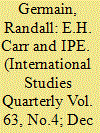

|
|
|
|
|
| Summary/Abstract |
Although the work of E.H. Carr has a prominent place in the scholarly history of international relations (IR), it is notably absent from the discipline of international political economy (IPE). This is puzzling, because Carr's analysis of international politics places a strong emphasis on the organic connection between politics and economics on an international scale. On this reading, his principal publications on IR can also be seen to chart a sophisticated conceptualization of what I want to label historical IPE. This essay retrieves such a reading of Carr for the discipline of IPE. It begins by interrogating the way in which Carr's work has been appropriated by modern IPE scholarship, in order to highlight the limited use made of the political economy dimension of his research. I then explore the historical and political economy aspects of Carr's writings to consider how his contribution might advance recent contemporary theoretical debate in the discipline. I pay particular attention to how his work charts an historical conception of IPE that can synthesize and move beyond the rationalist/constructivist binary that currently dominates theorizing in the discipline.
|
|
|
|
|
|
|
|
|
|
|
|
|
|
|
|
| 14 |
ID:
170019
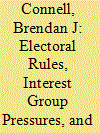

|
|
|
|
|
| Summary/Abstract |
Conventional wisdom dictates that democracies are reliable in upholding their international commitments. However, this assertion is at odds with democratic behavior in sovereign borrowing where democracies have sometimes imposed considerable losses on foreign creditors. Why do some democracies choose to renege on extremely large portions of their sovereign debt during economic crisis? This article argues that costs incurred by creditors are dependent on how the borrowing state's electoral system aggregates competing domestic economic interests. Internationally oriented economic interests prefer to minimize creditor losses since sizeable debt reductions are more likely to compromise access to foreign credit. Conversely, workers and domestic-oriented economic interests prefer to maximize losses faced by foreign creditors in order to ease the costs of austerity at home. By shaping the political incentives of policymakers, I argue that democracies with candidate-centric electoral systems should be associated with sovereign defaults that are less costly for foreign creditors. Under these electoral systems, governments hold incentives to cater primarily to internationally oriented economic interests that are best able to overcome the costs of collective action. Statistical evidence from 53 sovereign debt restructurings between 1978 and 2012 supports the main argument.
|
|
|
|
|
|
|
|
|
|
|
|
|
|
|
|
| 15 |
ID:
170021


|
|
|
|
|
| Summary/Abstract |
In this article, we elaborate two distinct ways of criticizing international practices: social critique and pragmatic critique. Our argument is that these two forms of critique are systematically opposed to each other: They are based on opposing epistemic premises, they are motivated by opposing political concerns, and they pursue opposing visions of social progress. Scholars of International Relations (IR) who want to work with the conceptual tools of practice theory are thus confronted with a consequential choice. Understanding the alternatives can help them to be more self-reflexive in their research practices and intervene more forcefully in contemporary political debates. We illustrate these advantages through a discussion of the scholarly debate on the practices of multilateral diplomacy through which the United Nations Security Council authorized a military intervention in Libya in 2011.
|
|
|
|
|
|
|
|
|
|
|
|
|
|
|
|
| 16 |
ID:
170029


|
|
|
|
|
| Summary/Abstract |
International dispute systems are often designed so that dispute body rulings do not set precedent. Yet governments have incentives to learn from prior decisions. Past rulings convey important information about how the law is applied. This is especially true in the World Trade Organization (WTO), where disputes frequently occur between the same members and over the same issues. I argue that case law increases the likelihood of early settlement. This helps explain why fifty percent of WTO cases end prior to a formal ruling. I use new data on the direction of ruling on each legal claim made in the first 450 WTO disputes. The results show that litigants are significantly more likely to settle early given the presence of previous legal decisions.
|
|
|
|
|
|
|
|
|
|
|
|
|
|
|
|
| 17 |
ID:
170025


|
|
|
|
|
| Summary/Abstract |
The United States—an architect of international criminal tribunals in the twentieth century—has since moderated its involvement in international justice. Striking to many observers is the United States’ failure to join the International Criminal Court—the institutional successor to the tribunals the nation helped install in Germany, Japan, the Balkans, and Rwanda. Interestingly, the US public’s support of the ICC increases yearly despite the government’s ambivalence about, and even hostility toward, the Court. Drawing on the US foreign policy public opinion literature, I theorize that human rights frames increase support for joining the ICC among Americans, whereas national interest frames decrease support. I administer an online survey experiment to evaluate these expectations and find consistent support. I additionally test hypotheses from the framing literature in American politics regarding the effect of exposure to two competing frames. I find that participants exposed to competing frames hold more moderate positions than participants exposed to a single frame but differ appreciably from the control group. Crucially, I find that participants’ beliefs about international organizations’ effectiveness and impartiality are equally, if not more, salient than the treatments. Thus, the ICC may be able to mobilize support and pressure policy change by demonstrating effectiveness and impartiality.
|
|
|
|
|
|
|
|
|
|
|
|
|
|
|
|
| 18 |
ID:
170010


|
|
|
|
|
| Summary/Abstract |
Armed groups are prone to instability and fragmentation, but what explains variation among the new groups that emerge? I argue that the internal politics preceding organizational splits is critical. When it comes to the survival of breakaway groups, those forming around single issue areas gain an advantage by attracting more homogeneous, preference-aligned recruits. On the other hand, those forming over a variety of grievances attract a more heterogeneous population whose divergent views undermine cohesion and cooperation, necessitate hierarchy, and diminish the odds of organizational survival. I test this argument with a case study of two Republican groups from Northern Ireland—the Real Irish Republican Army and the Irish National Liberation Army. The findings confirm my argument and underscore the limited utility of studying organizational fractures from the sole perspective of contemporaneous external events like conciliation and repression. Rather, I show how internal political dynamics influence the composition, identity, and overall trajectory of breakaway groups. This has implications for designing effective counterinsurgent policies, for understanding the formation of armed groups, and for anticipating whether breakaway groups are likely to escalate, moderate, or adopt spoiling behavior.
|
|
|
|
|
|
|
|
|
|
|
|
|
|
|
|
| 19 |
ID:
170027
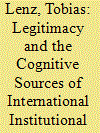

|
|
|
|
|
| Summary/Abstract |
How and under what conditions does legitimacy affect processes of international institutional change? This article specifies and evaluates three causal mechanisms by which variation in legitimacy induces institutional change in international organizations (IOs) and argues that an important, yet hitherto neglected, source of legitimacy-based change is cognitive in nature. Using survival analysis, we evaluate these mechanisms with a novel dataset on the establishment of parliamentary institutions in thirty-six regional organizations between 1950 and 2010. We find that the empowerment of supranational secretariats, engagement with the European Union, and parliamentarization in an organization's neighborhood increase the likelihood of regional parliamentarization. This suggests that legitimacy judgments that draw on cognitive referents provide an important source of international institutional change. We illustrate the underlying cognitive emulation mechanism with a case study of parliamentarization in the Association of Southeast Asian Nations.
|
|
|
|
|
|
|
|
|
|
|
|
|
|
|
|
| 20 |
ID:
170034


|
|
|
|
|
| Summary/Abstract |
Dissatisfied with their relative standing in the world, China and Russia are challenging the US-dominated liberal order. Could US accommodation of their status concerns reduce conflict? The psychological rationale for status accommodation is rooted in the insights of social identity theory (SIT), which argues that persistent status denial leads lower-status groups to “lash out.” Steven Ward (2017) objects that political scientists have misinterpreted SIT. In his view, impermeable group boundaries only affect individuals and do not lead to intergroup conflict. Ward's narrow critique overlooks the larger meaning and significance of SIT, which is about how frustration and anger over status barriers and unfair treatment motivate lower-status groups to challenge the status quo. Social competition is positional and zero-sum. Given the insights of SIT, Ward's recommendation that the United States demonstrate to China and Russia the futility of status competition is likely to provoke a backlash and increase the risk of military conflict. Instead, SIT implies a continuing process of status accommodation and efforts to maintain the legitimacy and stability of US leadership.
|
|
|
|
|
|
|
|
|
|
|
|
|
|
|
|
|
|
|
|
|